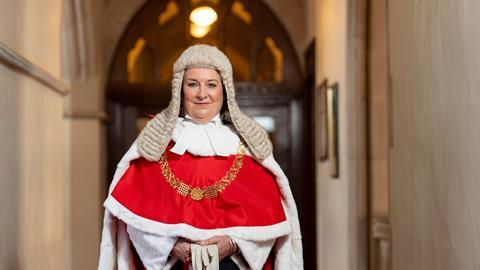‘Listing in the ether’ could be one way to speed up court timetables and cut the backlog, the lady chief justice told journalists today.
In her first press conference in the role, Baroness Carr praised her colleagues, saying her 'biggest asset is my judges'. She added: ‘They are extraordinary, they work in extremely difficult conditions, they work tirelessly and they are committed to serving the public and the rule of the law and that is a very special thing and you see that every day when you go out and about visiting courts.’
Speaking on court listings, Baroness Carr noted the use of ‘virtual regions’ by tribunals.
The heart of the 'One Judiciary' initiative is learning best practice from other jurisdictions, she said. 'A very good example is something the tribunals have done [which] is the introduction of what we call virtual regions which means listing in the ether and not linked to a particular physical court. What that means is something can go into the virtual region and any court, any tribunal in England and Wales, can deal with that particular case and that obviously speeds things up because you are not tied to a particular court that may be under particular pressure.
‘Learning from other jurisdictions is something we have not been doing enough of and I think it is something One Judiciary will really promote and improve.’
On open justice, the LCJ acknowledged the family transparency pilot, which has been extended to 16 courts across the country, as a ‘success’ .
Discussing diversity in the judiciary, Baroness Carr said: ‘Diversity is a day job, we have got a lot to do. We are doing well in terms of solicitors, and quite well in terms of gender.
‘Over half our tribunal judges are solicitors by background. We are doing much better with women, certainly up to the higher levels. We are making progress with certain ethnic minorities. We are not making enough progress when it comes to black people in particular. We do not have enough black judges and that is a priority for me to look at this year and also disabled judges, that is something I do not think we have looked at sufficiently in the past. Those are two of our focus areas under our strategy for this year.
‘I think it a really pressing area. We are doing so much in the space, you cannot turn for some sort of a mentoring scheme or opportunity or outreach or speech to schools. We have fantastic diversity and community relation judges. We are really trying but still not getting sufficient results.’
When asked about helping to make the courts estate more accessible, Baroness Carr revealed ‘one of the first things’ she had done in her role was to walk from the Royal Courts of Justice car park into court taking only an accessible route and though possible was ‘a lot of fuss’.
She said: ‘People should not have to make a fuss. The problem is money to make these changes, it is something we have not talked about enough.’
This article is now closed for comment.




























11 Readers' comments